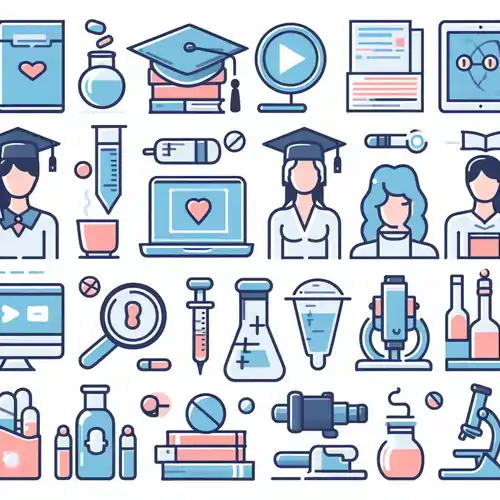Unlocking the Secrets of Pharmacology and Modern Medicine: A Comprehensive Guide for University Students


The Significance of Pharmacology in Modern Medicine: Bridging the Gap Between Theory and Practice
"The Significance of Pharmacology in Modern Medicine: Bridging the Gap Between Theory and Practice" illuminates the profound impact of pharmacology as the vital bridge connecting theoretical understanding with real-world medical applications. This section delves into the heart of pharmacological knowledge, emphasizing its pivotal role in shaping modern healthcare practices. By dissecting the fundamental principles of pharmacokinetics and pharmacodynamics, students gain not just theoretical insights, but a deep understanding of how drugs function within the human body. Furthermore, exploring the intricacies of drug development processes reveals the transformation of scientific theories into life-saving medications, showcasing the practical implications of theoretical knowledge. Armed with this holistic perspective, students can navigate the complexities of modern medicine, ensuring that their theoretical grounding finds meaningful applications in the clinical sphere. This understanding not only enriches their academic endeavors but also prepares them to be conscientious healthcare professionals capable of making informed decisions in the ever-evolving landscape of medical science.
Theoretical Foundations of Pharmacology
Pharmacology is a multidisciplinary science that blends concepts from biology, chemistry, and medicine. It serves as a bridge between theoretical knowledge and its practical application in healthcare. To excel in pharmacology assignments, students must grasp the foundational principles of this field.
To achieve this, one must start with the basics. Articles that explain the principles of pharmacokinetics (how drugs move within the body) and pharmacodynamics (how drugs interact with the body) are invaluable. Understanding these concepts forms the bedrock of pharmacology and equips students to analyze drug actions, mechanisms, and dosages effectively.
The Role of Pharmacology in Drug Development
In the realm of drug development, pharmacology serves as the guiding light, illuminating the path from scientific discovery to real-world application. The role of pharmacology in this multifaceted process is indispensable; it involves understanding the intricate interactions between drugs and biological systems, predicting how a drug will behave in the human body, and identifying potential therapeutic effects and side effects. Pharmacologists play a pivotal role in preclinical studies, meticulously examining the pharmacokinetic and pharmacodynamic profiles of candidate compounds. Their insights inform decisions made by pharmaceutical companies, guiding the selection of promising drug candidates for clinical trials. During these trials, pharmacologists continue to be instrumental, analyzing data to assess a drug's safety and efficacy. Their expertise ensures that only the most effective and safest drugs progress to market, where they ultimately improve and save lives. Pharmacology thus stands as the linchpin in the complex journey from a novel molecule in a laboratory to a life-changing medicine in a patient's hands, showcasing its indispensable role in the advancement of modern healthcare.
The Art of Drug Classification
Drug classification, often considered the cornerstone of pharmacology, is a nuanced art that involves categorizing drugs based on their chemical structure, therapeutic effects, and mechanisms of action. This intricate process allows pharmacologists and healthcare professionals to understand the diverse array of pharmaceutical agents available. By classifying drugs, researchers can discern patterns in their actions, enabling the prediction of potential effects and interactions within the human body. This artistry extends beyond textbooks, finding practical applications in hospitals and pharmacies, where pharmacists rely on these classifications to dispense medications safely and effectively. Mastering the art of drug classification equips students with a foundational skill, empowering them to decipher the complexities of pharmaceutical science and make informed decisions in the realm of modern medicine.
Mastering Drug Classes
One of the core aspects of pharmacology assignments is categorizing drugs into classes. Each class has unique properties, uses, and side effects. To help students in this endeavor, articles outlining drug classifications are indispensable. These articles should include comprehensive lists of drug classes, their mechanisms of action, and representative examples.
By mastering drug classes, students gain the ability to identify drugs based on their properties and therapeutic uses. This skill is particularly useful when tasked with assignments involving drug comparisons, interactions, and contraindications.
Modern Medicine's Marvels: Targeted Therapies
In recent years, pharmacology has witnessed a paradigm shift towards personalized medicine. Articles focusing on targeted therapies provide a glimpse into this exciting frontier. Targeted therapies involve tailoring drug treatments to an individual's genetic makeup, allowing for more effective and less toxic interventions.
Understanding the principles behind targeted therapies can be a game-changer for students preparing assignments related to precision medicine and the future of pharmacology.
Navigating the Complex World of Drug Interactions
Navigating the intricate landscape of drug interactions is a crucial aspect of pharmacological study, demanding a deep understanding of how different substances can influence each other within the human body. Students delving into this realm explore the complexities of how drugs can potentiate, antagonize, or alter the effects of one another. This understanding is essential not only in preventing adverse reactions but also in optimizing therapeutic outcomes. It requires a keen eye for detail, as seemingly unrelated medications can interact in unexpected ways, affecting absorption rates, metabolic processes, or even efficacy. By mastering the art of deciphering drug interactions, students gain a valuable skillset that allows them to make informed decisions in medical practice, ensuring patient safety and the effectiveness of treatment regimens. Assignments centered around drug interactions challenge students to apply this knowledge in practical scenarios, honing their problem-solving abilities and preparing them for the complexities of the healthcare field.
The Science of Drug-Drug Interactions
The science of drug-drug interactions delves into the intricate web of biochemical processes and physiological responses that occur when multiple medications are introduced to the human body simultaneously. Understanding this phenomenon is paramount as it directly impacts patient safety and treatment effectiveness. Drug-drug interactions can occur at various stages within the body, such as absorption, metabolism, distribution, and excretion, leading to alterations in drug concentrations and potentially adverse outcomes. Students exploring this area of pharmacology dissect the underlying mechanisms, exploring enzymes like Cytochrome P450 and drug transporters, elucidating how these elements influence the pharmacokinetics of co-administered drugs. Moreover, they grapple with the classification of interactions, ranging from synergistic effects that enhance therapeutic outcomes to antagonistic interactions that negate each other's effects. By unraveling the complexities of drug-drug interactions, students gain invaluable insights, equipping them to assess and mitigate risks in real-world medical scenarios and excel in their pharmacology assignments.
Pharmacogenomics: Tailoring Drug Therapy to Genetics
Pharmacogenomics is another exciting field within pharmacology. It explores how an individual's genetic makeup influences their response to drugs. Articles on pharmacogenomics empower students to comprehend the importance of genetic variations in drug metabolism and efficacy. This knowledge can be instrumental when tackling assignments related to personalized medicine and optimizing drug therapies for specific patient populations.
Ethical Considerations in Pharmacology
Ethical considerations lie at the heart of pharmacology, shaping the responsible conduct of research, patient care, and drug development. In the realm of pharmacology, where decisions can significantly impact human lives, students are tasked with understanding the ethical dimensions of their work. This involves grappling with questions of patient autonomy, informed consent, and the balance between risks and benefits in drug therapies. Ethical pharmacologists consider the social and cultural implications of their work, ensuring that research is conducted with integrity and respect for all stakeholders involved. Moreover, they navigate the complexities of drug pricing, accessibility, and global healthcare disparities. By exploring ethical considerations in pharmacology, students not only gain a deep understanding of the moral compass that guides their profession but also learn to critically assess the implications of pharmacological practices in a broader societal context. Assignments focusing on ethical dilemmas challenge students to apply ethical theories and principles, fostering a sense of responsibility and empathy that is indispensable in the field of pharmacology.
Balancing Benefits and Risks
In the realm of pharmacology, the delicate balance between benefits and risks is paramount. Every drug, while holding the promise of therapeutic relief, carries potential side effects and risks. Pharmacologists and healthcare professionals face the challenging task of evaluating these aspects meticulously, weighing the benefits a drug offers against the possible adverse reactions it might induce. This process demands a nuanced understanding of the patient's medical history, current health status, and the specific context of their illness. Ethical decision-making in pharmacology involves transparent communication with patients, ensuring they comprehend the potential outcomes and are actively involved in the decision-making process. Striking this equilibrium is not only a scientific challenge but also a moral imperative. Students exploring this facet of pharmacology learn to critically assess the available evidence, foresee potential complications, and communicate effectively, preparing them to make informed and ethically sound decisions in their future medical practice. Assignments focusing on this aspect of pharmacology hone students' analytical skills, encouraging them to navigate complex scenarios and arrive at well-considered conclusions in the face of intricate medical situations.
Ensuring Patient Safety
Ensuring patient safety is the ultimate goal of pharmacology and modern medicine. It encompasses a multifaceted approach that begins with rigorous drug testing, continues through vigilant monitoring during clinical use, and extends to the post-marketing phase. Pharmacologists and healthcare professionals play a pivotal role in this process, meticulously analyzing potential risks and benefits of medications before they reach patients. This involves a continuous cycle of assessment, reassessment, and adaptation, considering individual patient profiles, genetic factors, and possible drug interactions. In the ever-evolving landscape of pharmaceuticals, safeguarding patients involves not only understanding the pharmacological properties of drugs but also recognizing the socio-economic factors that can impact treatment adherence and outcomes. Assignments focusing on patient safety challenge students to think critically, encouraging them to propose innovative solutions that prioritize the well-being of patients above all else. By grappling with the complexities of patient safety in their assignments, students cultivate a mindset of vigilance and responsibility, essential qualities in the realm of healthcare.
The Road to Success in Pharmacology Assignments
In conclusion, pharmacology is a dynamic field that constantly evolves with scientific advancements and the changing landscape of healthcare. To excel in university pharmacology assignments, students must have a solid foundation in pharmacokinetics and pharmacodynamics. They should also be well-versed in drug classifications, interactions, and the ethical considerations surrounding pharmacological interventions.
As modern medicine continues to embrace personalized and targeted therapies, students should stay updated with the latest research articles in these areas. This knowledge will not only help them ace their assignments but also prepare them for a rewarding career in the healthcare industry.
By exploring the suggested articles and mastering these fundamental aspects of pharmacology, students will unlock the keys to success in their university pharmacology assignments and contribute to the advancement of modern medicine.